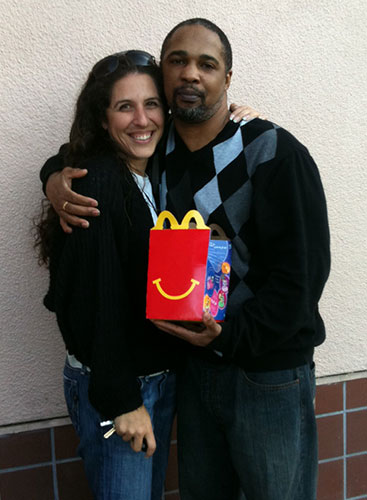Time passes differently in prison, and not just for prisoners. When we visit our clients, we are typically in a small, white room with no clock, blank walls, and no phones, computers or other devices. We spend hours having the kinds of conversations there simply isn’t time for on the “outside” – conversations in which we are completely focused on one another without distraction.
Often, these men and women have been waiting years, if not decades, for an attorney to come, for someone, anyone, to listen to their story. But the first thing they do when we arrive is ask about how we are doing. They ask about our drive, express appreciation that we took the hours needed to come see them, and notice things like an engagement ring on a student’s finger that wasn’t there on a previous visit, and inquire about wedding plans. And then, they patiently listen to the answer. If you mention your birthday once, you will receive a birthday card on the right day, eight months later. If you happen to mention you are hoping to someday have a window in your office, you can expect to receive a painting of a window depicting a peaceful scene just as soon as the prison is able to process the outgoing mail.

NCIP Attorney Paige Kaneb and NCIP client Maurice Caldwell enjoy McDonald’s together as his first meal after his exoneration.
In retrospect, our exonerees talk about how much it meant to them to have us treat them with such dignity; they don’t seem to realize just how much their humanity becomes magnified in those clinical, white rooms where every freedom has been taken from them except their right to speak to an attorney. Their humanity shines through the chambray blue prison garb and stone walls and barbed wire fences. This humanity, this vulnerability, combined with our strong belief in their innocence, is the reason we keep fighting when it all seems hopeless or the process feels endless.
Three hours of intense conversation is exhausting, and by the time 180 minutes have passed, either the guards are telling me time is up, or my overwhelming thirst and hunger are telling me it’s time to leave. Over one hundred prison visits later, I still feel a strange mix of giddiness, fortune, and sadness when I walk out of that secure facility. I’m always so grateful that I’m free to walk out those gates, to get my phone from my car and call my loved ones – to choose whether I want McDonald’s or Subway for the ride home. But it also feels so unfair and depressing to leave behind a kind and thoughtful human being who is going back to a tiny cell in which they do not belong.
It’s a strange experience to have fun spending time with an innocent person in prison. It’s disheartening every time you have to leave them behind. But their humanity and our belief in justice keep us going back until they can walk out with us. And that moment is pure joy.